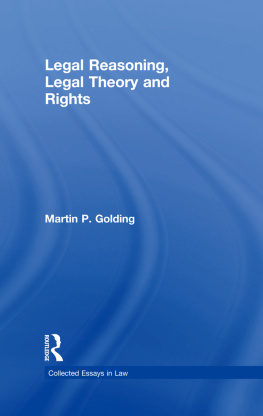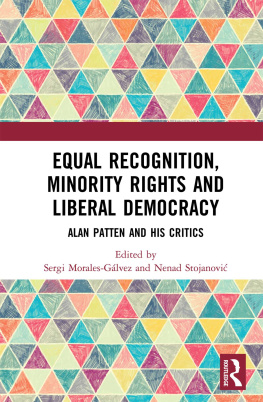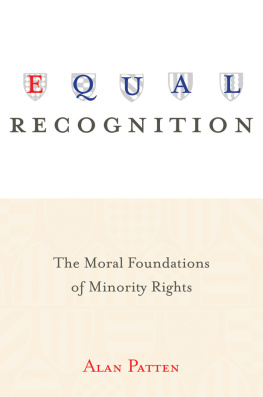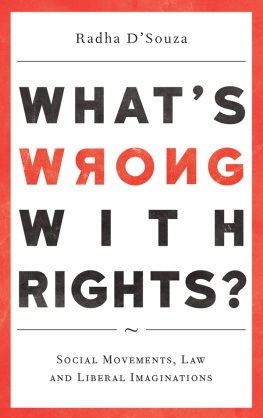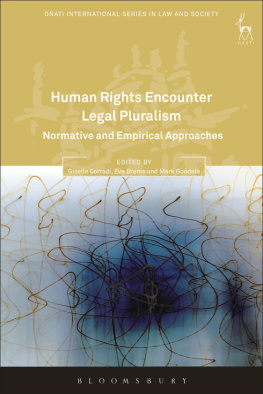COMMUNITY AND COLLECTIVE RIGHTS
This book presents an argument for the existence of moral rights held by groups and a resulting account of how to reconcile group rights with individual rights and with the rights of other groups. Throughout, the author shows applications to actual legal and political controversies, thus tying the normative theory to actual legal practice. The author presents collective moral rights as an underlying normative explanation for various legal norms protecting group rights in domestic and international legal contexts. Examples at issue include rights held by indigenous peoples, by trade unions, and by religious and cultural minority groups. The account also bears on contemporary discussions of multiculturalism and recognition, on debates about reasonable accommodation of minority communities, and on claims for third generation human rights. The book will thus be relevant both to theorists and to legal and human rights practitioners interested in related areas.
Volume 2 in the series Law and Practical Reason
Law and Practical Reason
The intention of this series is that it should encompass monographs and collections of essays that address the fundamental issues in legal philosophy. The foci are conceptual and normative in character, not empirical. Studies addressing the idea of law as a species of practical reason are especially welcome. Recognising that there is no occasion sharply to distinguish analytic and systematic work in the field from historico-critical research, the editors also welcome studies in the history of legal philosophy. Contributions to the series, inevitably crossing disciplinary lines, will be of interest to students and professionals in moral, political, and legal philosophy.
General Editor
Prof George Pavlakos (Antwerp and Glasgow)
Advisory Board
Prof Robert Alexy (Kiel)
Prof Samantha Besson (Fribourg, CH)
Prof Emilios Christodoulidis (Glasgow)
Prof Sean Coyle (Birmingham)
Prof Mattias Kumm (New York)
Prof Stanley Paulson (St. Louis and Kiel)
Prof Joseph Raz (Columbia Law School)
Prof Arthur Ripstein (Toronto)
Prof Scott Shapiro (Yale Law School)
Prof Victor Tadros (Warwick)
Editorial Assistant
Triantafyllos Gouvas (Antwerp)
Volume 1: The Normative Claim of Law
Stefano Bertea
Community and Collective Rights
A Theoretical Framework for Rights held by Groups
Dwight Newman

OXFORD AND PORTLAND, OREGON
2011
Published in the United Kingdom by Hart Publishing Ltd
16C Worcester Place, Oxford, OX1 2JW
Telephone: +44 (0)1865 517530
Fax: +44 (0)1865 510710
E-mail:
Website: http://www.hartpub.co.uk
Published in North America (US and Canada) by
Hart Publishing
c/o International Specialized Book Services
920 NE 58th Avenue, Suite 300
Portland, OR 97213-3786
USA
Tel: +1 503 287 3093 or toll-free: (1) 800 944 6190
Fax: +1 503 280 8832
E-mail:
Website: http://www.isbs.com
Dwight Newman 2011
Dwight Newman has asserted his right under the Copyright, Designs and Patents Act 1988, to be identified as the author of this work.
All rights reserved. No part of this publication may be reproduced, stored in a retrieval system, or transmitted, in any form or by any means, without the prior permission of Hart Publishing, or as expressly permitted by law or under the terms agreed with the appropriate reprographic rights organisation. Enquiries concerning reproduction which may not be covered by the above should be addressed to Hart Publishing Ltd at the address above.
British Library Cataloguing in Publication
Data Data Available
ISBN: 978-1-84113-228-0
Typeset by Hope Services Ltd, Abingdon
Printed and bound in Great Britain by
TJ International Ltd, Padstow, Cornwall
Acknowledgements
This books stems originally from a DPhil thesis completed in the Oxford University Faculty of Law. I thank first and foremost Timothy Endicott for his dedicated and patient supervision of the doctoral project. He was an excellent guide in the methods of legal philosophy, a firm but fair critic following his careful reading of drafts, and an important mentor. I thank Joseph Raz and Chris McCrudden, who each took on supervision of my work for a term through exchange supervisions and who each carefully analysed several chapters and pressed me onward on key issues. I thank John Gardner and Peter Oliver, who acted as examiners, for their careful examination and discussion of the thesis product and their very helpful and encouraging suggestions. I also thank Sandy Fredman and Ray Davern for their scrutiny of part of the thesis at the MPhil stage. At the publication stage, I thank Richard Hart for his receptiveness to the project, the anonymous reviewers for their helpful comments, and Harts publications team for their efficiency and skill.
I have also learned from many audiences. I had the opportunity (with thanks to the Rhodes Trust, to St Johns College, and to the Oxford Faculty of Law for travel funding) to present pieces of this work at different points in time at the Oxford Jurisprudence Discussion Group and Oxford Human Rights Discussion Group, at an International Law and Ethics Conference Series (ILECS) meeting in Belgrade, at the University of Antwerps International Conference on Religious Identity and Cultural Pluralism, at the Wits Workshop on Law and Society at the University of the Witwatersrand, at the Law University of Lithuania (now Mykolas Romeris University) in Vilnius, at Leuvens Centre for Ethics, Social, and Political Theory, and at Centre of Canadian Studies conferences in Edinburgh. At the risk of excluding others whose names I did not catch, I thank the following for important questions on those occasions: Cathi Albertyn, Jovan Babic, Nick Barber, Samantha Besson, Paul Bou-Habib, Herman de Dijn, Avigail Eisenberg, Vladimir Gligorov, John Haldane, Jonathan Klaaren, Evelina Kurgonaite, Dimitrios Kyritsis, James Morauta, Dragan Milovanovic, Jorge Menezes Oliveira, John ODowd, Zoran Oklopcic, Harry Papadopoulos, Amir Paz-Fuchs, Irma du Plessis, Danny Priel, Prince Saprai, Patricia White, Burleigh Willkins and Steve Winter. I also thank the following for helpful bibliographical suggestions: Jeffrey Brand-Ballard, Nick Bunnin, Tomas Castillo, Matthew Harding, Santiago Legarre, Banu Paksoy, Oonagh Reitman, Irit Samet-Porat, Mike Sanderson, Henry Shue, Delaine Swenson, John Tasioulas and Shlomit Wallerstein.
For commenting in written form or engaging in other extended dialogues, I extend special thanks to Gerry Bradley, Rob Edger, John Finnis, Sbastien Grammond, Les Green, Peter Jones, Maris Kpcke-Tintur, David Miller, Jim Nickel, Ken Norman, George Rainbolt, Denise Raume, Helder de Schutter, Ron Stevenson and John Whyte. I must also single out Will Kymlicka, who was both gracious and helpful in response to my critique of his arguments when I presented at a session he attended. As a great philosopher once told me, we have been most influenced by and learned the most from the writers whose works we most criticise.
Predecessor forms of two chapters have appeared as journal articles: Collective Interests and Collective Rights (2004) 49 American Journal of Jurisprudence 127; and Exit, Voice, and Exile: Rights to Exit and Rights to Eject (2007) 57 University of Toronto Law Journal 4347. I also published a predecessor form testing some of the arguments from chapter one in Putting Kymlicka in Perspective: Canadian Diversity and Collective Rights in Stepehen Tierney (ed)
Next page

